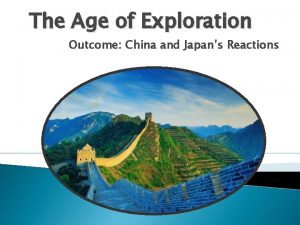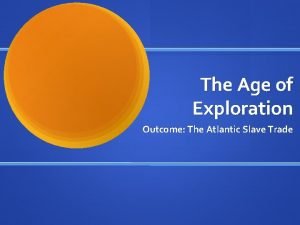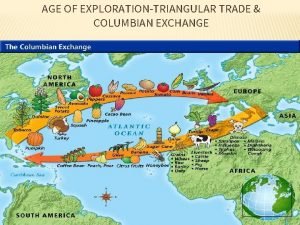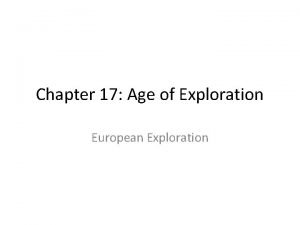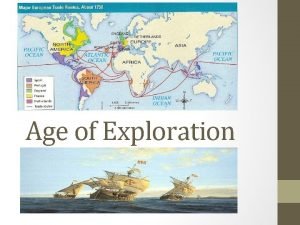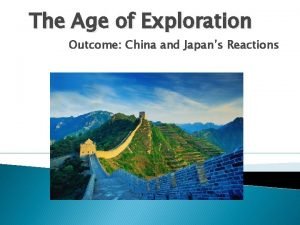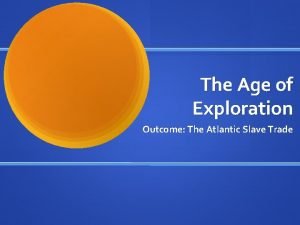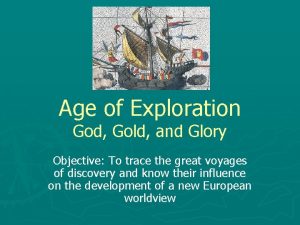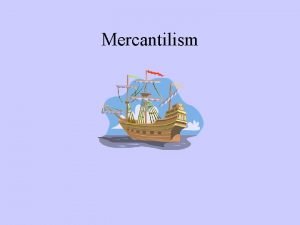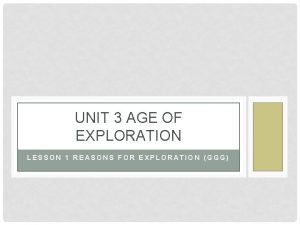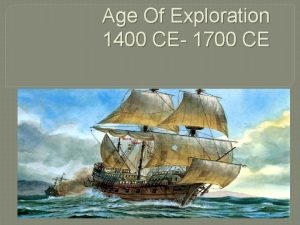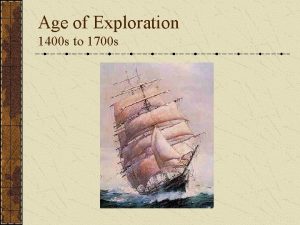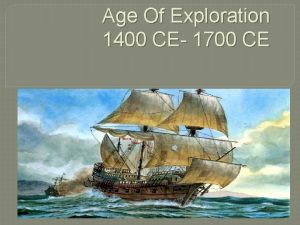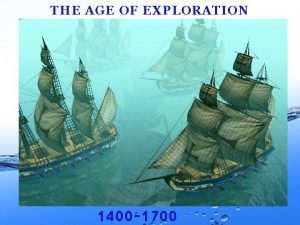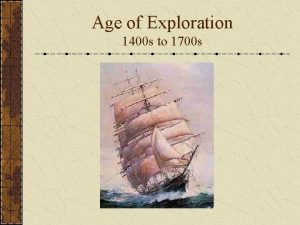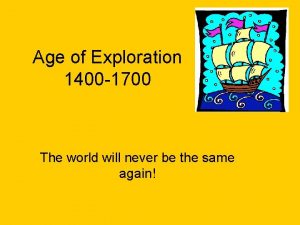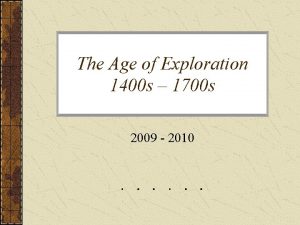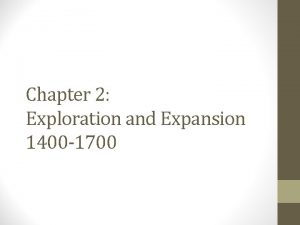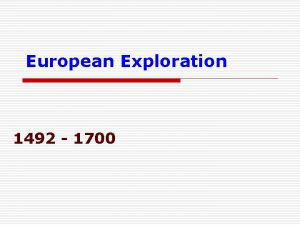Age of Exploration 1400 s to 1700 s














![Some Examples Spanish control of Latin America [old imperialism] British control of India Berlin Some Examples Spanish control of Latin America [old imperialism] British control of India Berlin](https://slidetodoc.com/presentation_image_h2/008c5a0c729289ccd7685d989c155ccf/image-15.jpg)


- Slides: 17

Age of Exploration 1400 s to 1700 s

Motives Search for new trade routes wanted to find a quicker way to Asia Desire for new products Crusades and travels of Marco Polo stimulated an interest in Asian goods (silk, spices, jewels/gold) Technology improved that allowed overseas exploration; gunpowder allowed Europeans to dominate Religion Christian rulers wanted to spread religion

Effects Native American civilizations destroyed European diseases killed millions of Native Americans European powers built extensive overseas empires Large numbers of Europeans moved to Americas Native American crops (corn, potato, tomato) brought to Europe [Colombian Exchange] Demand for African slaves increased Capitalism expanded with growth of trade Cultural exchanges occurred [cultural diffusion]

Marco Polo In the late 1200 s, he traveled to China [court of Kublai Khan] and brought back stories and goods to Europe Inspired many later explorers

Christopher Columbus Accidentally found America while looking for a westward route to Asia Called the natives “Indians” because he thought he was in the West Indies, off the coast of Asia His voyages considered a turning point in history

Vasco da Gama Discovered an allwater route from Europe to India Sailing was easier than traveling overland on the Silk Road

Ferdinand Magellan First person credited with circumnavigating the world (sailing all the way around the world)

Hernando Cortes Conquered the Aztec Empire in Mexico in 1519

Francisco Pizarro Conquered the Inca Empire in Peru in 1533

Trans-Atlantic Slave Trade 1500 s to 1800 s

Causes Europeans wanted cheap labor for work in the Americas Due to the demands of the agricultural economies of the New World (sugar, tobacco, cotton) The native peoples of America did not survive the labor

Effects Encouraged African warfare tribes went to war with other tribes to obtain slaves to trade for guns Disrupted African culture it created a legacy of violence, bitterness and social disorder Increased cultural diffusion Slaves brought their songs and culture to New World Prejudice against Africans The birth of racism

Imperialism Domination by one country over the political, economic, or cultural life of another country or region

Causes of Imperialism Economic Social Need for raw materials created by Industrial Revolution Desire for place to invest excess money Drive to spread Christianity Political Desire for great power status [White Man’s Competitive Burden] drive to gain Rule by control of an strongest and area (for fittest- need to military) before spread superior a rival could do culture [Social so Darwinism]
![Some Examples Spanish control of Latin America old imperialism British control of India Berlin Some Examples Spanish control of Latin America [old imperialism] British control of India Berlin](https://slidetodoc.com/presentation_image_h2/008c5a0c729289ccd7685d989c155ccf/image-15.jpg)
Some Examples Spanish control of Latin America [old imperialism] British control of India Berlin Conference to divide Africa Japanese control of Manchuria

Positive Effects of Imperialism Built up infrastructure (roads, railroads, and bridges) Education improved Improved medical care Food supply increased Brought stability and unification to some areas Created industries, improved standard of living

Negative Effects of Imperialism People with common backgrounds separated Natural resources exploited Native cultures damaged Promoted racism Economic self-sufficiency lost Destroyed traditional patterns of trade Cash crop overemphasized Family life disrupted Introduced Western vices and diseases
 Stone age, bronze age iron age timeline
Stone age, bronze age iron age timeline Iron age bronze age stone age timeline
Iron age bronze age stone age timeline The age of exploration outcome china and japan's reactions
The age of exploration outcome china and japan's reactions The age of exploration outcome the atlantic slave trade
The age of exploration outcome the atlantic slave trade Age of exploration videos
Age of exploration videos God gold and glory pictures
God gold and glory pictures Triangular trade and columbian exchange
Triangular trade and columbian exchange Chapter 17 the age of exploration
Chapter 17 the age of exploration The age of exploration definition
The age of exploration definition Joint stock company age of exploration
Joint stock company age of exploration What was the outcome of china's age of exploration?
What was the outcome of china's age of exploration? Heroic age of antarctic exploration
Heroic age of antarctic exploration The age of exploration outcome the atlantic slave trade
The age of exploration outcome the atlantic slave trade God glory gold
God glory gold Age of exploration gold
Age of exploration gold Age of exploration god
Age of exploration god Mercantilism during the age of exploration
Mercantilism during the age of exploration Ggg
Ggg


